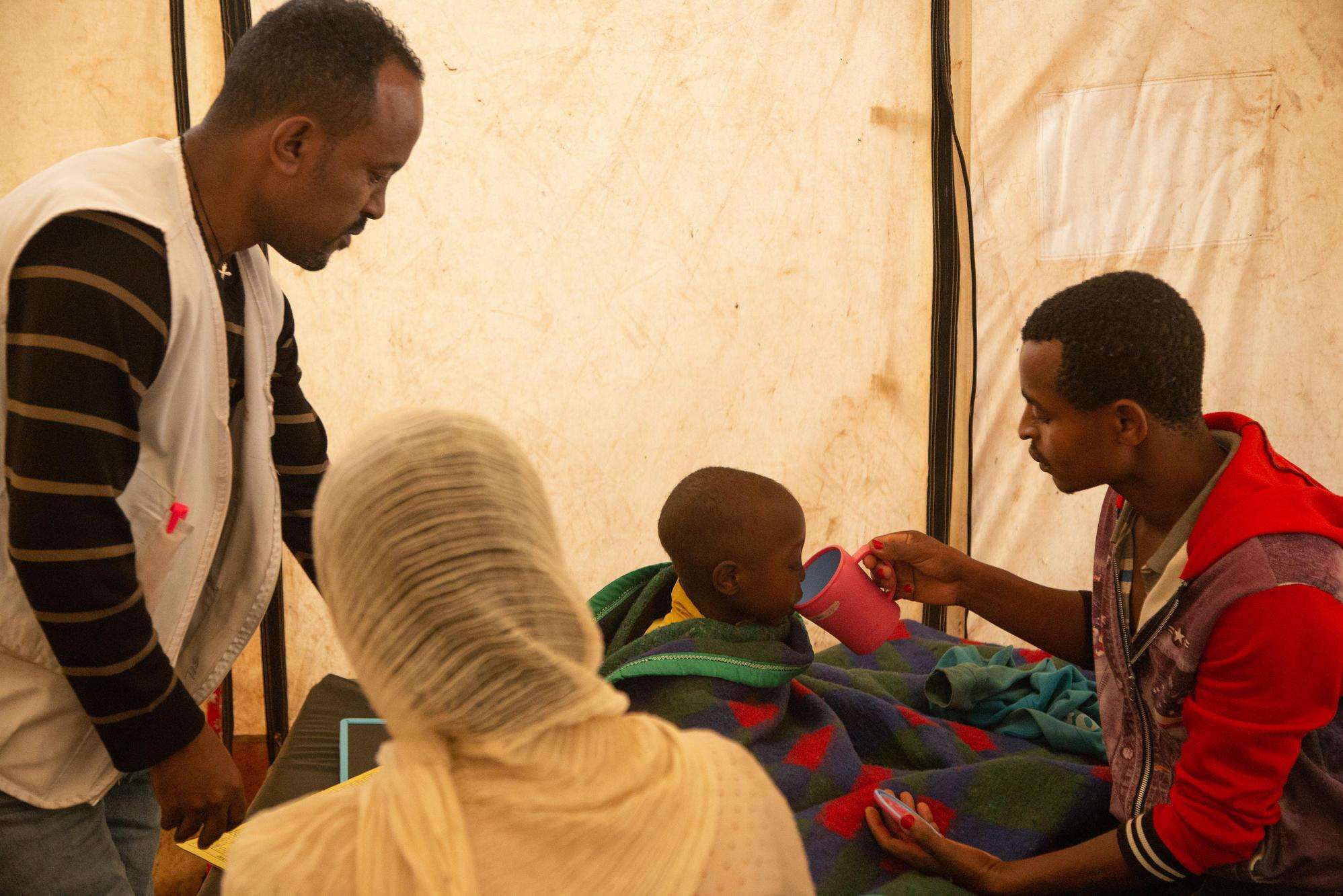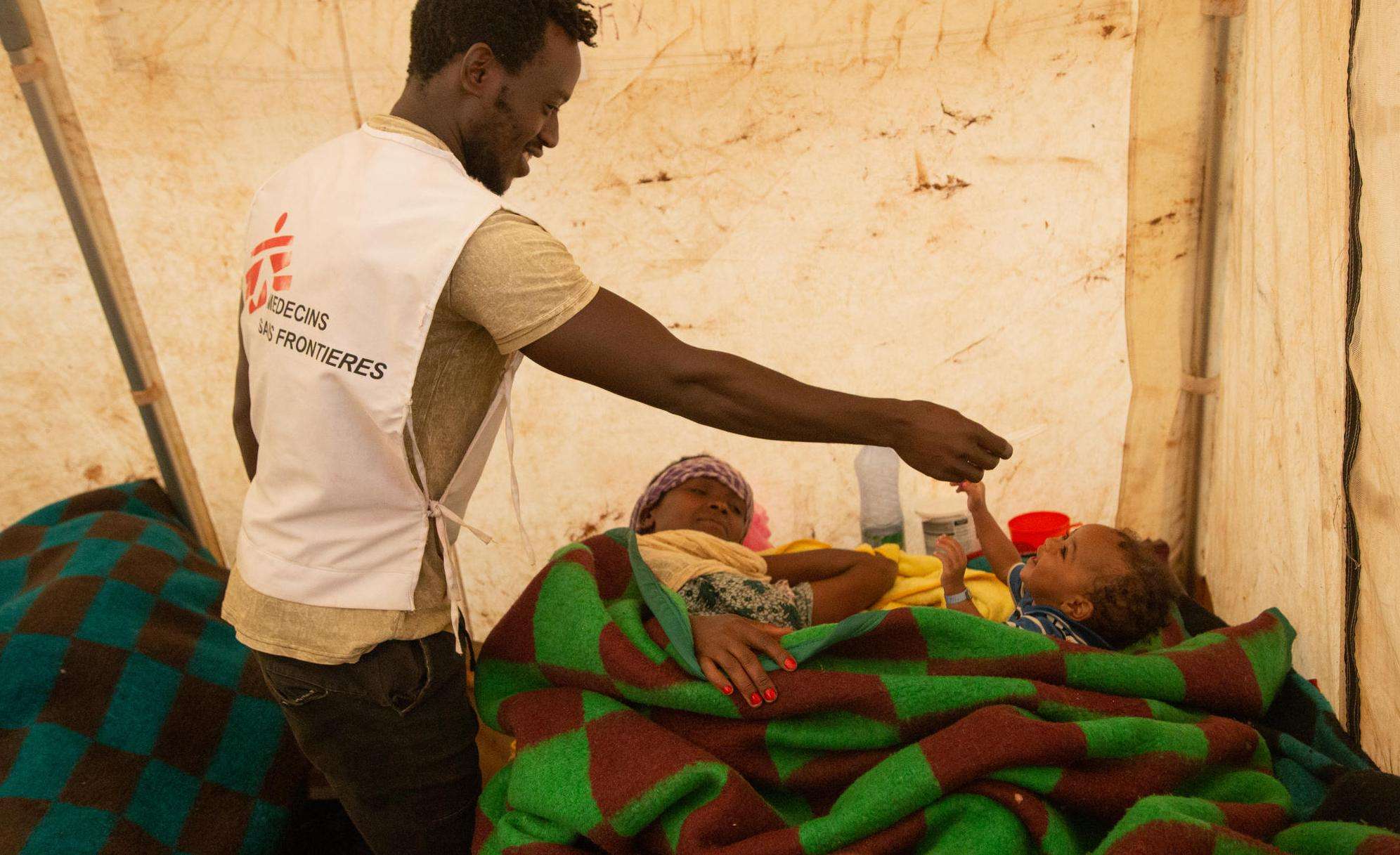የጌዴኦ- ጉጂ ሰብአዊ ቀውስ የህፃናት ሞትን እያስከተለ እንደሆነ ድንበር የለሽ የሀኪሞች ቡድን መረጃ ያሳያል።ተፈናቃዮቹ በሚመለከታቸው አካላት በመረሳታቸው በተከሰተው የማያቋርጥ የሰብዓዊ ቀውስ ሕፃናት ለሞትና ለከፍተኛ አደጋ መጋለጣቸውን ድርጅቱ MSF ባወጣው ሪፖርት አትቷል።
Ethnic violence fuels cycles of displacement in Ethiopia
Thousands of people have shuttled back and forth between southern Ethiopia’s Gedeo and Guji areas over the past 15 months following an outbreak of ethnic violence in April 2018 and repeated efforts by authorities to relocate them. The camps where they were staying have now been closed, but many people remain displaced, sheltering either in host communities or in their areas of origin. The majority live in precarious conditions with little humanitarian assistance, struggling to protect their children from malnutrition and other diseases.
Malnutrition rates have been high since the crisis began. From July to December 2018, Doctors Without Borders/Médecins Sans Frontières (MSF) treated more than 6,000 malnourished children as part of a wider emergency intervention.
This year, the severity of patients’ conditions is even higher. When MSF teams arrived again in Gedeo in April 2019 following a precipitous deterioration of the humanitarian situation, MSF’s assessments showed that rates of severe acute malnutrition among children under five and pregnant and lactating women were well above the emergency threshold. In the early days of this new emergency response, at least one child each week would arrive dead at the health facilities supported by MSF in Gotiti and Gedeb.
Since April 2019 MSF has enrolled some 2,340 children in outpatient nutritional programs and treated 560 children suffering from severe acute malnutrition with complications in stabilization centers.

In May 2019, Ethiopian authorities demolished the camps for displaced people ahead of a plan to return them to their areas of origin. While many have indeed returned, the health of both returnees and those who stayed on in Gedeo is still at risk. MSF teams in Gedeo continue to see large numbers of patients, including some who have come all the way from Guji, mainly to treat their malnourished children.
“Since the camps were dismantled, there hasn’t been a big change in the medical conditions of the patients we see in Gedeo,” said MSF medical team leader Caroline Harvey. “We treat mainly diarrhea and respiratory infections, with some cases of meningitis and a lot of skin diseases, all related to people’s poor living conditions. Even if they are no longer in camps, those who opted to remain in Gedeo are still living in very poor conditions, whether they have rented shelters, bought land, or are staying in churches or schools or with relatives.”
Although the health care that MSF provides is free of charge, visiting a doctor in Ethiopia generally costs money, which deters many parents from taking their malnourished or sick children to health facilities until they are in critical condition. In some locations, malnutrition treatment does not go beyond distributing Plumpy’Nut (a peanut-based ready-to-use therapeutic food), with the result that children are often not referred for specialized treatment in a timely manner.
The events of the past year have been particularly challenging for people like Simein, a 26-year-old woman from Kercha district. In addition to looking after her three young children, she also cares for the two children of her sister, who died some months ago. Her two-year-old nephew was recently admitted to the hospital in Gedeb for malnutrition treatment.
“I have all these children with me,” she says. “I feel worried about how to bring them up as I have no sources of assistance.” During the crisis, she worked for a while as a community mobilizer and managed to save a little money, but her savings are now depleted. Simein’s story is similar to those of other displaced people, spending the past 15 months constantly moving from place to place.
“This last time, when the government announced the return plan [in May 2019], we decided to join others and go back too,” says Simein. “The authorities in Guji gave us blankets and plastic sheeting, and we started building a temporary shelter on our land. They promised they would provide more assistance—some essential items and food. We built the shelter and waited for further assistance, but it never arrived.”
As they waited, Simein and her family were threatened and their shelter was destroyed, forcing them to go back on the road. Just two weeks after they left, the family was back in Gedeo.

Despite the challenges, some returnees have managed to leave behind the ghost of the conflict that uprooted them and restart their lives. Bekele, along with his three wives and 15 children, sought safety last year in Guji after fleeing intercommunal tensions in Gedeo. They are now back in their home, which was spared the violence and was still standing.
“After leaving our property, every moment was challenging and we had no comfort, no money,” says Bekele. “My children often became sick; they didn’t have clothes to wear. We returned here permanently in May [2019]. All of my neighbors are back as well.”
Bekele is confident that the bad times are over. “Now there is peace and, if the situation continues like this, there shouldn’t be renewed violence,” he says. “We don’t have a problem anymore with the Gedeos and we communicate well with each other. Now I have planted corn again and I am waiting for the new crop to grow.”
Bekele and his family are fortunate and look to the future. But for many others, there is still a very long way to go.